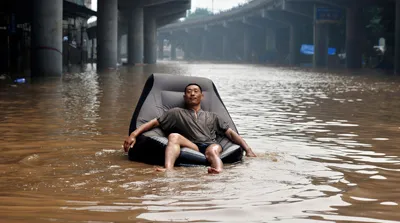Chinese journalists are questioning government propaganda due to conflicting reports of the death toll following Saturday’s devastating flooding in Beijing. Like the Wenzhou train crash and the Sichuan earthquake, the tragedy has galvanized mainstream and online journalists–and the official narrative is crumbling under their scrutiny.
A report from The Associated Press today offers a fascinating glimpse of an empowered press corps:
The Changjiang Daily newspaper reported online that Beijing city officials at a news conference late Wednesday were swarmed afterward by reporters trying to get additional comments. It said one journalist with the official broadcaster China Central Television asked spokesmen why they didn’t give the new death toll when she could see from the paper in their hands that the toll was 61 dead including five civil servants. The officials left quickly without responding, the report said. The journalist wasn’t identified by name in the report. By Thursday afternoon the report had been deleted.
Readers would be forgiven for doubting this took place in China: Reporters “swarming” a news conference in the wake of a natural disaster? A state broadcast journalist challenging official figures? It’s a description of a healthy, demanding watchdog press–at least until we learn the article describing it has been censored.
In a news alert this week, CPJ likened Beijing’s flooding crisis to the Wenzhou train crash which took place a year ago Monday. Propaganda officials then exhorted journalists to “emphasize miracles” in the rescue effort, and avoid questioning the causes–just as they did this week. Compare our description of the media’s response to the Wenzhou disaster with the AP excerpt above:
Journalists chased Ministry of Railways spokesman Wang Yongping and demanded a press conference. A propaganda “miracle,” in the form of a 2-year-old rescued after survival was declared impossible, became a focal point of the encounter. Online accounts said a rescue worker defied orders in order to save her, casting the official search in a less flattering light. Asked for comment, Wang could only repeat that her discovery was miraculous. “It was not a miracle,” one reporter yelled back.
It’s heartening that this kind of pushback is becoming more routine.
The change, in large part, is due to the Internet. With microblog users exchanging information and reactions at high speed, many users are becoming media critics, pouncing on compliant news outlets for failing to hold officials accountable. In the wake of the Wenzhou crash, we reported, “Internet commentators were furious that state mouthpiece People’s Daily and three other newspapers ran coverage of a military ceremony on front pages the day after the accident.” Now look at the headline that six state newspapers chose to run this past Sunday, the day after the worst of the floods, as reported by the Berkeley-based China Digital Times: “The Whole Party and the People of Every Nationality in the Country Unite with Speed and Force, Forging Valiantly Down the Mighty Path of Socialism with Chinese Characteristics.”
Journalists on the ground, and citizen microblog users, have learned from Wenzhou. They are talking back, sharing data, and have already defined Saturday’s tragedy with a poignant sound bite, “China’s Katrina,” according to China Digital Times. Sunday’s tone-deaf patriotic headlines prove that, by contrast, propaganda authorities guiding state media coverage have learned nothing at all.
Wenzhou coverage was not an unqualified success. Censors banned journalists from revisiting the site to commemorate the anniversary this year, according to the The Wall Street Journal. Though the Ministry of Railways promised to examine the causes of the disaster, victims complain they have yet to hear from any investigators, the Journal said. Despite the lack of public trust, China is plowing ahead with rail investment, Bloomberg reports.
When Shifang environmental protests were in the news earlier this month, CPJ expressed concern that public expressions of anger at the government, commonly perceived as victories at home and abroad, risk “perpetuating a cycle of protests that authorities can diffuse without the need for reform or redress for serious injustice.” Journalists in Wenzhou had the power to challenge the state’s narrative, but not to ensure full accountability after public attention waned. “Officials kowtowing to citizens’ demands to quell protests has become routine in China, but the follow-through has not,” we argued.
China’s media could correct that imbalance. If AP’s unnamed CCTV journalist kept asking her difficult questions a week, a month, a year from now, the shortcomings of the city’s handling of the floods would remain visible. But you can’t blame her for stepping back. One year ago today, CCTV producer Wang Qinglei broadcast a reflective episode of his news show “24 hours” on the Wenzhou train crash; he was suspended a week later. For freelancers, punitive measures are even harsher: We documented 27 journalists imprisoned for their work in China on December 1, 2011. One, Tan Zuoren, had challenged the official death toll following the 2009 Sichuan earthquake.
Fear of reprisals may quell news coverage in the short term, but the indignation that fuels independent reporting online, and motivates journalists to argue back at press conferences, accumulates over time. As the disgraced Wang Qinglei put it on his microblog last year: “Constantly restricting and blocking is a way to make things appear peaceful on the surface, but it’s actually going to stir up an even bigger crisis.” The flooding may not be the crisis that tips the balance. But it has caused another wave of reporters, professional and otherwise, to get involved and document what happened, in spite of restrictions. Propaganda officials, by failing to adapt to this reality, reveal themselves as the archaic, vindictive bureaucrats they are. They have no place in today’s China. We hope the next generation of leaders thinks so too.
